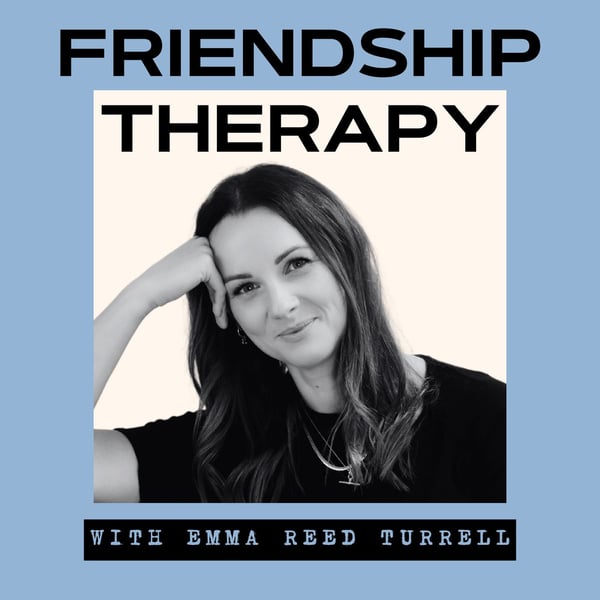S1, Ep 8 BITESIZE Friendship Therapy: Child Ego State - the adapted child and the free rebellious child
Friendship Therapy
Emma Reed Turrell
4.8 • 1.2K Ratings
🗓️ 28 June 2024
⏱️ 20 minutes
🧾️ Download transcript
Summary
Jemima joined us to talk about her experience of being diagnosied with dyspraxia when she was just six years old, and the impact that neurodivergence has had on her life and friendships. We heard about the remedial classes that she was put through, the hours spent throwing and catching balls in her back garden, the extra effort that she had to put in to try to fit in with the other children; all of which led her to resent her diagnosis. Later, in adulthood, Jemima found herself rejecting the idea of being 'parented' by her friends, having already spent almost her entire life being told what her limits were and what she definitely couldn't do because she is neurodivergent.
In this bitesize episode, Emma returns to Eric Berne's parent, adult, child model in transactional analysis, exploring how the different facets of the parent and child ego states might be showing up in Jemima's friendships and in her own internal processes.
Eric Berne's parent, adult, child theory: https://www.simplypsychology.org/transactional-analysis-eric-berne.html
If you’d like to apply to appear on the podcast in season two, please click the link below to fill out the form:
https://forms.gle/owsfs6DVxVdTMFo46
---
Friendship Therapy is hosted by Emma Reed Turrell, produced by Chris Sharp and Lauren Brook.
---
Social media:
Emma Reed Turrell @emmareedturrell
Friendship Therapy @friendshiptherapypod
Email: [email protected]
Transcript
Click on a timestamp to play from that location
| 0:00.0 | This podcast is sponsored by Protein Works, creators of award-winning tasty food, shakes and snacks. |
| 0:07.0 | Welcome to another bite-size episode of Friendship Monday's episode was Jemima and talking to us all about |
| 0:26.8 | Jemima was Jemima was talking to us all about |
| 0:30.4 | neurodivergence and friendship and what it's like to come at friendship when your process is different to someone else's. |
| 0:42.0 | Jemima was coming specifically from a perspective of a diagnosis of dyspraxia when she was six and an ADHD process that she recognizes and she talked to us about how hard it can be when you have, I guess, |
| 1:01.2 | a responsibility to close the gap between yourself, herself and the people in her life. |
| 1:10.0 | So let's see how from a psychoeducational perspective we might be able to understand |
| 1:15.0 | Jemima's situation but for anybody who experiences friendships where one person is, well, we call it neurotypical, does that mean very much? I don't know, |
| 1:28.2 | and maybe where someone else is bringing something that's more neurodiverse. |
| 1:33.0 | Jemima talked about the fact that she hated having a diagnosis of dyspraxia. |
| 1:38.0 | She said, I rejected it. |
| 1:41.0 | The result of this diagnosis was that the world worked to try to help her be more like the other kids. |
| 1:50.0 | She would spend time in her back garden while her brother helped her practice catching. |
| 1:57.0 | She would have extra lessons in gym. |
| 2:00.0 | She would have the remedial lessons that meant that she was being tutored above and beyond other children, |
| 2:07.0 | given the time and attention and I guess hopefully the intention was the skills and the ability to access a world |
| 2:18.0 | that was structured for kids who were more neuro-typical. She had to do more, she had to make more effort, |
| 2:28.2 | she had to close the gap, the gap that I think of in terms of neurodiversity as between me, who I am, and this, societies, conventions and expectations and quote unquote norms. |
| 2:44.0 | It's often left to the responsibility of the person who brings an element of |
| 2:48.4 | neurodivergence to do that closing the gap work. |
| 2:53.4 | And yet they're often also asked to accept less |
| 2:57.9 | as a result. |
... |
Transcript will be available on the free plan in -278 days. Upgrade to see the full transcript now.
Disclaimer: The podcast and artwork embedded on this page are from Emma Reed Turrell, and are the property of its owner and not affiliated with or endorsed by Tapesearch.
Generated transcripts are the property of Emma Reed Turrell and are distributed freely under the Fair Use doctrine. Transcripts generated by Tapesearch are not guaranteed to be accurate.
Copyright © Tapesearch 2025.

